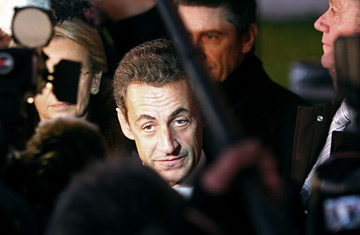
French President Nicolas Sarkozy after visiting police officers injured during clashes with rioters
Sighs of relief were exhaled across France Wednesday, with news that rioting in suburbs north of Paris had eased considerably during the third consecutive night of unrest. But even if the relative calm restored to the housing projects of Villiers-le-Bel lessened fears France might be experiencing the same kind of outbreak of violence in Paris's "banlieues" which spread to over 300 French towns in 2005, there was one reason for jittery French observers to hold their breath. Just as there were signs of cooling tempers among rioting youths, French President Nicolas Sarkozy vowed that he planned to hunt them down and haul them to court. His first move was to visit police officers injured by rioters, promising "we'll find the shooters, and deploy whatever means that requires." "That's not something we can tolerate," Sarkozy continued. "It's got a name: attempted murder."
That tough talking came upon Sarkozy's return to France from China — a trip that made him absent for the first 72 hours of violence in Villers-le-Bel that began when two local youths were killed during a traffic accident with a police car. After two nights of considerable disorder that left around 80 police injured (versus 200 for the entire three weeks of rioting in 2005), a massive deployment of riot officers helped bring near order to the area Tuesday evening. Limited skirmishes were in stark contrast to the pitched battles, arson and even gunshots that rioters inflicted on police during the previous two evenings. Fear that unrest would spread to similarly disgruntled residents of blighted French projects — as it did in 2005 — waned, meanwhile, when youths who had torched cars in handful of towns neighboring Villiers-le-Bel on Monday night remained peaceful. However, nearly 20 cars were burned and two arson attempts against libraries were unsuccessfully attempted in projects outside of Toulouse where clashes had also occurred two years ago.
While virtually no one will contest Sarkozy's view — nor challenge his duty as head of state to fully back officers who have been attacked while trying to enforce law and order — the question is, does he need to be making that particular point when the rioters who sought to injure or kill police seem to be calming down? This issue of Sarkozy's timing is key, given his notorious reputation when, as the Interior Minister, he was seen using racially loaded terms to denounce project hooligans just days before the riots exploded in 2005.
"The problem isn't what he's saying, it's that he's made such a reputation for being defiant and provocative that many people will interpret this as him baiting the projects as he did in 2005," says Dominque Reynié, a political analyst and professor at the Foundation of Political Science in Paris. "No one has any sympathy for the thugs behind these riots, but Sarkozy might have been wiser to show his support of the police in a lower-profile manner. Whether it's fair to do so or not, were rioting to break out again now, lots of people would hold him partly responsible for that."
Though the risk of continued or spreading violence remained, sociologists and security experts said they believed the significant dip in violence Tuesday night considerably lowered the risk of contagion — at least till the next time. French government officials aren't taking any chances on a possible resurgence in Villiers-le-Bel. French Interior Minister Michèle Alliot-Marie, for example, saluted the "calmed situation," but promised that considerably reinforced "police presence will be maintained for as long as necessary." Sarkozy also convened an urgent meeting of key cabinet members to discuss ways to prevent a renewal of attacks — and propose measures to address the complaints of discrimination and socio-economic disenfranchisement at the heart of anger in the projects. The government is also set to reveal what it has called a "Marshall Plan" for French projects — a name frequently used to describe the new housing drive rolled out by the previous administration, which itself was one of a long line of mostly futile schemes rolled out since 1977 to improve banlieue life.
